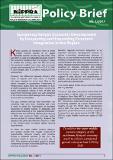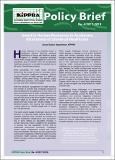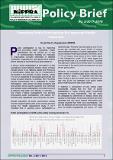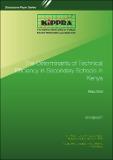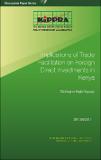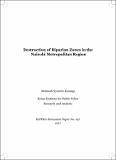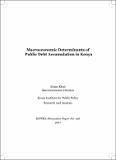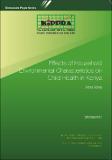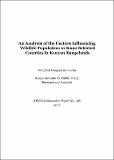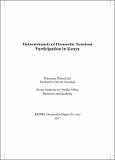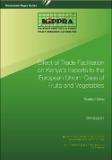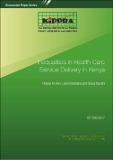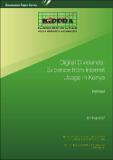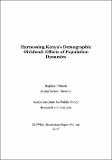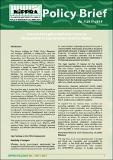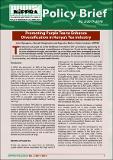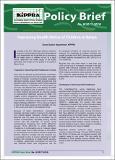3. KIPPRA Research Publications: Recent submissions
Now showing items 361-380 of 708
-
Policy Brief No. 01 of 2017 on Sustaining Kenya's Economic Development by Deepening and Expanding Economic Integration in the Region
(The Kenya Institute for Public Policy Research and Analysis, 2017)The report has been prepared at a time when the government is taking stock on implementation of Medium Term Plan (MTP) II, and kick-starting preparations for the second last medium term plan (MTP III) of Vision 2030. ... -
Policy Brief No. 04 of 2017-2018 on Invest in Human Resources to Accelerate Attainment of Universal Healthcare
(The Kenya Institute for Public Policy Research and Analysis, 2017)Human resource is an important input in healthcare delivery. Attaining universal healthcare in Kenya will therefore largely depend on whether insurance coverage will be wide enough and affordable for most of the population, ... -
Policy Brief No. 05 of 2017-2018 on Promoting Public Participation for Improved Health Outcomes
(The Kenya Institute for Public Policy Research and Analysis (KIPPRA), 2017)Public participation is key to improving and promoting health outcomes. Public participation can be defined as a way of communication whereby an institution or organization consults interested or affected individuals, ... -
Discussion Paper No. 199 of 2017 on the Determinants of Technical Efficiency in Secondary Schools in Kenya
(The Kenya Institute for Public Policy Research and Analysis (KIPPRA), 2017)Kenya has made tremendous progress towards access to basic education, which encompasses pre-primary, primary and secondary education. This is manifested in the increasing demand for secondary school education. Secondary ... -
Discussion Paper No. 189 of 2017 on Implications of Trade Facilitation on Foreign Direct Investments in Kenya
(The Kenya Institute for Public Policy Research and Analysis (KIPPRA), 2017)This study examines the effects of trade facilitation on foreign direct investments in Kenya. Open, predictable and transparent trade and investment regimes have become necessary due to growing fragmentation of production ... -
Discussion Paper No. 197 of 2017 on Destruction of Riparian Zones in the Nairobi Metropolitan Region
(The Kenya Institute for Public Policy Research and Analysis (KIPPRA), 2017)The global development agenda has placed the sustainability of cities as a critical agenda focusing on the development of safe, resilient and sustainable cities. The frequency of flooding in cities and the collapse of ... -
Discussion Paper No. 196 of 2017 on Macroeconomic Determinants of Public Debt Accumulation in Kenya
(The Kenya Institute for Public Policy Research and Analysis (KIPPRA), 2017)The high and continuous increase in public debt, alongside its servicing burden, is increasingly impeding Kenya’s efforts in achieving a sustained economic growth rate of 10 per cent per annum as conceived in the Kenya ... -
Discussion Paper No. 200 of 2017 on Effects of Household Environmental Characteristics on Child Health in Kenya
(The Kenya Institute for Public Policy Research and Analysis (KIPPRA), 2017)Health is postulated to be the greatest asset in any nation. However, majority of the Sub-Saharan African (SSA) countries experience adverse health outcomes and a manifest of poor household environmental characteristics. ... -
Discussion Paper No. 198 of 2017 on An Analysis of the Factors Influencing Wildlife Population in Some Selected Counties in Kenyan Rangelands
(The Kenya Institute for Public Policy Research and Analysis (KIPPRA), 2017)This study seeks to analyze some of the factors that influence wildlife population within the Kenyan rangelands. Wildlife have continued to decline within the rangelands, catching the attention of the government because ... -
Discussion Paper No. 203 of 2017 on Determinants of Domestic Tourism Participation in Kenya
(The Kenya Institute for Public Policy Research and Analysis (KIPPRA), 2017)Tourism has over the recent past become an important industry providing crucial economic stimulus to both developed and developing nations. This has made it necessary to understand tourism demand. This study sets out to ... -
Discussion Paper No. 195 of 2017 on Analysis of Opportunity Cost of Agroforestry among Smallholder Farmers in Western Kenya
(The Kenya Institute for Public Policy Research and Analysis (KIPPRA), 2017)Agroforestry presents great potential in the restoration of agricultural land and forest base, yet its uptake by smallholder farmers in Kenya remains disappointingly low in the face of deforestation, averaging 12 per ... -
Discussion Paper No. 193 of 2017 on Effect of Trade Facilitation on Kenya's Exports to the European Union: Case of Fruits and Vegetables
(The Kenya Institute for Public Policy Research and Analysis (KIPPRA), 2017)The objective of this study was to estimate the effects of trade facilitation on Kenya’s fruits and vegetables exports to the European Union using an augmented gravity model. The trade effect of improving trade facilitation ... -
Discussion Paper No. 190 of 2017 on Inequalities in Health Care Service Delivery in Kenya
(The Kenya Institute for Public Policy Research and Analysis (KIPPRA), 2017)This study investigated inequalities in health care service delivery using the Service Delivery Indicators (SDI) survey 2012 conducted by KIPPRA on behalf of the Ministry of Health and the World Bank. The objective of this ... -
Discussion Paper No. 188 of 2017 on Social Cohesion Index for Kenya: A Methodological Note
(The Kenya Institute for Public Policy Research and Analysis (KIPPRA), 2017)Social cohesion is important for sustained development and peaceful coexistence. Broadly, like glue, it binds individuals together based on trust, shared loyalties, positive relationships, solidarity and constructive ... -
Discussion Paper No. 194 of 2017 on Digital Dividends: Evidence From Internet Usage in Kenya
(The Kenya Institute for Public Policy Research and Analysis (KIPPRA), 2017)This paper examines the digital dividends arising from work-related Internet usage in Kenya by first evaluating the factors influencing Internet usage and, second, the effect of Internet usage on earnings from wage employment ... -
Discussion Paper No. 191 of 2017 on Harnessing Kenya's Demographic Dividend: Effects of Population Dynamics
(The Kenya Institute for Public Policy Research and Analysis (KIPPRA), 2017)This study investigates the effects of population dynamics as Kenya strives to reap from demographic dividend arising from accelerated economic growth as the population changes. At the moment, 78 per cent of Kenya’s ... -
Discussion Paper No. 192 of 2017 An Input-Output Table for Kenya and its Application to Development Planning
(The Kenya Institute for Public Policy Research and Analysis (KIPPRA), 2017)This study investigates the effects of population dynamics as Kenya strives to reap from demographic dividend arising from accelerated economic growth as the population changes. Now, 78 per cent of Kenya’s population is ... -
Policy Brief No. 07 of 2017-2018 Towards Strengthening Public Financial Management in County Governments in Kenya
(The Kenya Institute for Public Policy Research and Analysis (KIPPRA), 2017)The Kenya Institute for Public Policy Research and Analysis (KIPPRA) in collaboration with the World Bank undertook the first sub-national Public Expenditure and Financial Accountability (PEFA) assessment in six selected ... -
Policy Brief No. 03 of 2017-2018 on Promoting Purple Tea to Enhance Diversification in Kenya's Tea Industry
(The Kenya Institute for Public Policy Research and Analysis (KIPPRA), 2017)The discovery of clone TRFK 306/1 of purple tea was in line with the aspirations of Vision 2030 that Kenya needs to diversify its tea products and add value to enhance productivity and boost economic growth in the ... -
Policy Brief No. 08 of 2017-2018 on Improving Health Status of Children in Kenya
(The Kenya Institute for Public Policy Research and Analysis (KIPPRA), 2017)Investing in the first 1,000 days of life is critical for long-term human capital productivity. Examples of such investments are those that aim at promoting the health status of children which, to a large extent, ...

